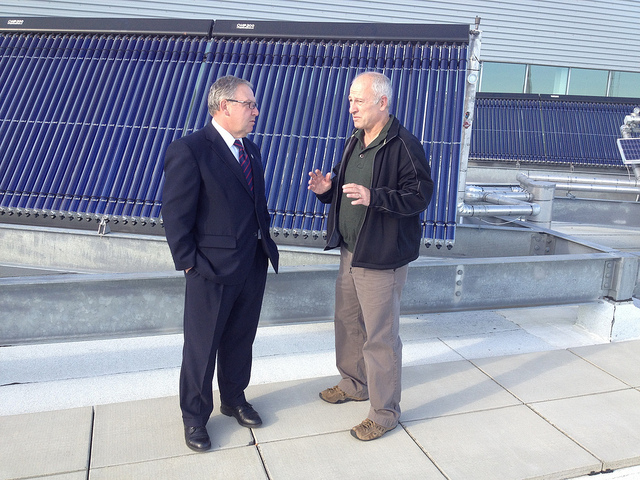Please support our coverage of democratic movements and become a supporting member of rabble.ca.
Efficiency Nova Scotia, the conservation agency funded by your power bill, is reporting good progress as the public buys into the notion of saving both energy and money.
The province-wide electricity load has been cut by 4.3 per cent so far — enough energy saved last year alone to power 16,000 homes — and an “energy-efficiency industry” of small businesses is growing to service all this.
Excellent. Now what’s keeping us from going all the way and actually adopting those forms of energy that conserve by definition?
Consider natural gas for homes, especially in metro Halifax, to which the energy establishment is either indifferent or outright hostile.
Last fall, I wrote a couple of columns, jump-started by two Dalhousie University experts in the matter, who were outraged that they lived 100 metres from the Dal main line but couldn’t get hooked up.
The question was on many minds in HRM, which I heard about in spades. Gas was hailed as an economic saviour for decades, the question went. It’s been ashore for some 13 years, and New England has been hooking up like crazy with our gas. So where is it?
The answer is that the whole operation has been hived off to a monopoly, Heritage Gas, a subsidiary of AltaGas of Calgary. It is guaranteed a 10 per cent return (13 per cent for most of the past decade) while borrowing costs are minimal, and it is cherry-picking the high-paying industrial and institutional stuff.
Homes don’t deliver HG’s lofty profit requirements — if you want gas, you have to go on a campaign to convince enough of your neighbours to do the same until you can more or less pay the company tribute.
A few thousand homes are hooked up out of a possible couple of hundred thousand in HRM alone, with a snail’s pace foreseen for the indefinite future.
Michael Poulton, a retired professor of urban economics, has proposed that those areas deemed uneconomic by HG be taken over by another agency — a gas commission like the Halifax Water Commission — to roll out the network systematically, which it would be able to do far more cheaply merely by borrowing at regular rates instead of paying HG’s usurious returns.
This is so reasonable, it squeaks. But my first question is not: “Why aren’t we doing it?” It’s: “Why can’t we even talk about it?”
The energy implications would be huge, as both oil and electricity would be replaced by a cheaper, less polluting fuel. As a retired Nova Scotia Power engineer I know reminded me again recently, burning gas for electricity delivers it to the home at 25 to 30 per cent efficiency. Delivered directly for heating, hot water, cooking and even clothes-drying, it’s 95 per cent efficient, and at the equivalent of three to four cents per kilowatt-hour, compared to 13 cents from the power lines.
But at the official level, this issue does not exist. The city, political parties, the province — nothing.
HG, perhaps embarrassed, did make a few token moves. Last winter, presumably at its behest, the province OK’d the Carlin Burner, a converter for oil furnaces that almost halves the cost of natural gas installation.
What do I see next? The oil heating industry attacking the burner as risky despite the fact that it’s been standard equipment in New England for years (and not a fraction as risky as having an oil tank on your property) — and, says Poulton, introducing it so late is a bung-up that means the people who installed before now paid twice what they should.
But nobody speaks for domestic natural gas, so the smear goes unanswered.
Officially, we’re trying desperately to get off dirty coal and imported oil. Here’s one way to do it, but we can’t talk about it. Why? Is is because the energy interests are so rigidly entrenched that nothing can move? Is it because the whole Nova Scotia business/political establishment is one soggy wad of no-can-do despite its occasional prattle about innovation and enterprise?
I haven’t even gotten to solar and small wind (as opposed to big wind), but let me tell you about the stuff I get from New England. Over there, the regional grid operator (grid operation and energy production are separate — a good idea) is saying over $400 million has been saved on transmission lines that were not needed because of increased efficiency and what they call DG — distributed generation. That is solar, micro wind and small hydro. Not building more power lines — what a novel idea!
With regard to Efficiency Nova Scotia, sometimes they seem like little green men set up to keep environmentalists quiet, but not part of the photo-op. Like domestic natural gas, solar, micro wind etc., maybe it’s time it was.
Ralph Surette is a veteran freelance journalist living in Yarmouth County. This article was first published in the Chronicle Herald.
Photo: Green Energy Futures/flickr



